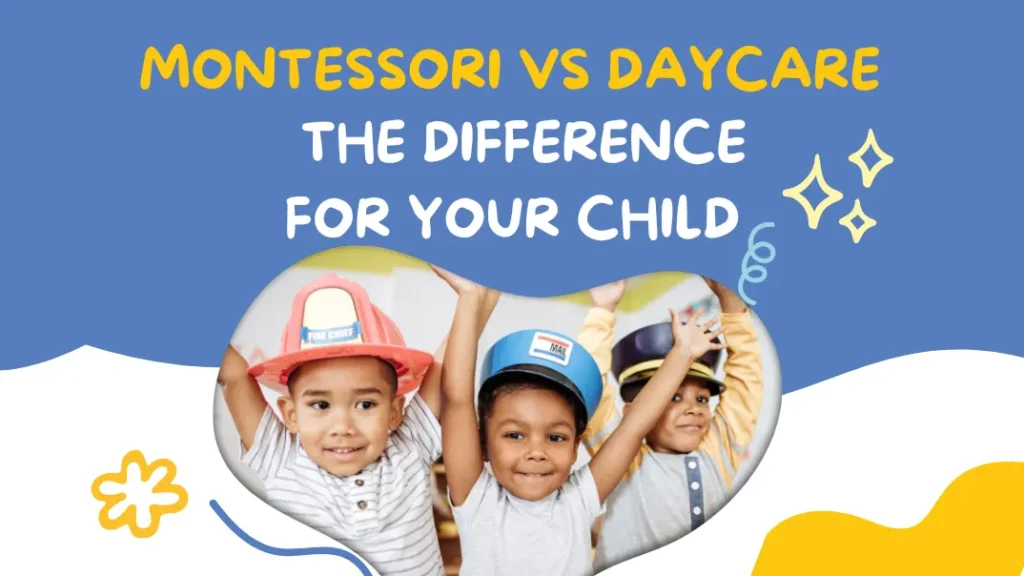Parents often face a challenging decision when choosing early education for children: Montessori vs daycare. Early childhood education is foundational, influencing your child’s development, social skills, and a lifelong love for learning. Montessori and daycare offer unique environments, yet each is built around distinct philosophies and goals.
Understanding the fundamental differences can guide you to a decision aligning with your child’s values and goals for early development. While both options support young children, they offer unique approaches, benefits, and experiences that can shape your child’s growth in distinct ways.
In this article, we’ll take a detailed look at Montessori vs daycare, examining the philosophies, classroom structures, learning approaches, and, of course, the benefits of each.
Understanding Montessori Education
Montessori education, developed by Dr. Maria Montessori, centers around the idea that children learn best in a self-directed environment where they are given freedom within limits. This child-centric approach is designed to develop independence, critical thinking, and a natural curiosity for learning through a well-prepared environment and hands-on activities.
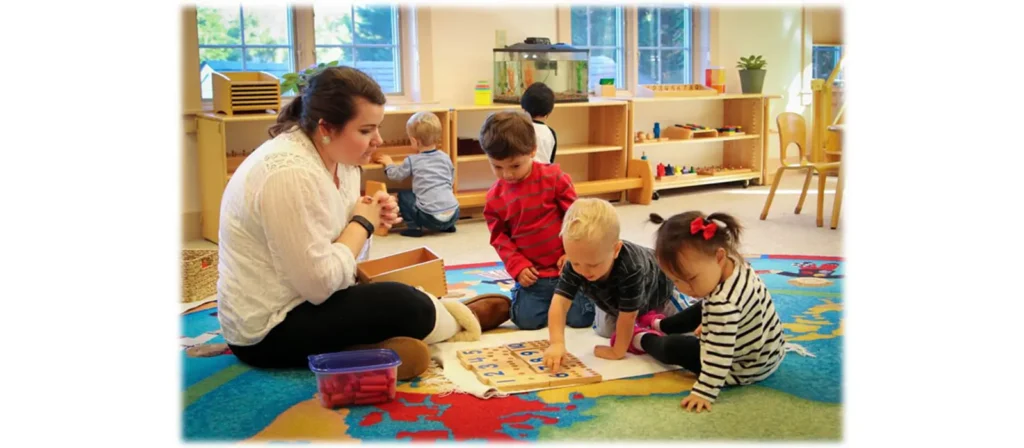
Montessori Philosophy in Early Education
In a Montessori classroom, children are encouraged to explore a variety of learning materials placed strategically around the room. Activities support physical, emotional, social, and cognitive development. Each material has a specific purpose: developing fine motor skills, teaching numbers, or introducing language skills. This structure nurtures children’s ability to make choices, enhancing responsibility, focus, and intrinsic motivation.
Focus on Self-Directed Learning
A fundamental difference between the Montessori daycare vs daycare is the emphasis on self-directed learning. In Montessori, children select their activities from a carefully prepared selection of materials, which enables them to progress at their own pace. Teachers observe and support rather than directly instruct, encouraging children to solve problems independently and explore subjects such as math, science, and language through sensory experiences.
Multi-Age Classroom Structure
Montessori classroom designs are typically multi-age, meaning children of varying ages (often within three years) learn together. In this environment, younger children look up to older peers and learn from their experiences, while older children reinforce their knowledge by teaching younger ones. This structure creates a community feel and fosters a sense of empathy, patience, and respect among students, which can benefit social and emotional development.
Understanding Daycare
Daycare centers provide a safe, structured environment that meets children’s immediate care needs, often supporting children from infancy to age five. While some daycare centers may include learning activities, their primary goal is to provide reliable, nurturing supervision, often for parents who work full-time.
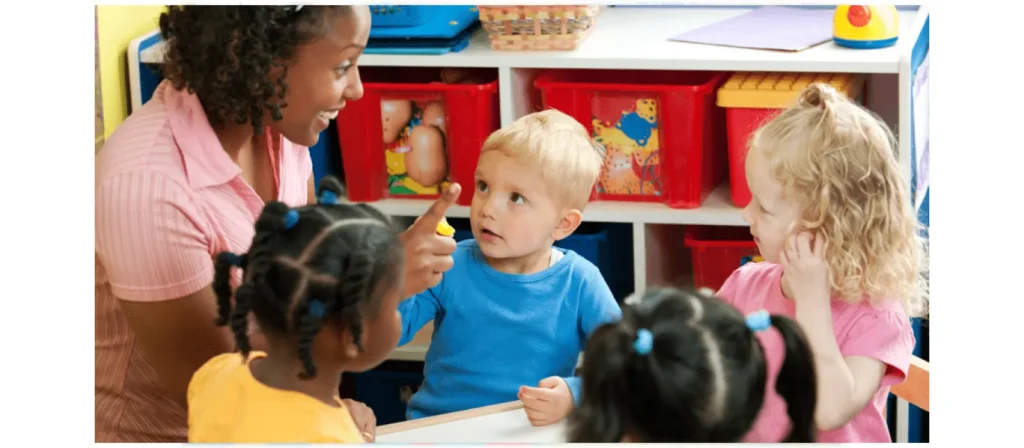
Primary Focus on Care and Safety
In daycare vs Montessori comparisons, traditional daycare centers prioritize care and safety. Daily routines include meals, naps, and supervised playtime, ensuring children have a predictable schedule. Daycare centers aim to foster a warm, friendly space where children feel secure, helping them build relationships with caregivers and peers.
Structured Group Activities
Daycare centers follow a consistent daily schedule, incorporating meals, rest, and play activities. Caregivers lead group-based activities, such as storytelling, crafts, and outdoor play, encouraging social interaction and cooperative skills. While structured, daycare centers are more flexible in their academic approach than Montessori, focusing on socialization and emotional well-being rather than formal learning.
Flexible Schedules to Accommodate Parents
Most daycare centers cater to the scheduling needs of working parents, offering long hours and flexible pick-up and drop-off times. This makes daycare a practical solution for families needing reliable full-day care, particularly for infants and toddlers who are too young for Montessori’s structured learning programs.
Don’t just dream it, design it! Let’s chat about your custom furniture needs!
Montessori vs Daycare: What’s the Similarity?
Despite their differences, Montessori and daycare programs share certain goals, such as creating a safe and nurturing environment for children. Here’s a side-by-side comparison highlighting the daycare and Montessori differences and similarities:
| Feature | Montessori | Daycare | Similarity |
|---|---|---|---|
| Safe and Nurturing Environment | Both prioritize safety and emotional security, providing children with a reliable environment. | Prioritizes safety and emotional well-being, providing a supervised space for children to play and socialize. | Introduces practical activities like cleaning, cooking, and self-care to foster independence. |
| Social Interaction | Encourages socialization through collaborative activities in a multi-age classroom setting. | Focuses on group activities, playtime, and interaction with peers of the same age group. | Both environments promote social skills and allow children to form friendships. |
| Development of Life Skills | Maintaining a structured, predictable environment allows children to independently follow a routine. | Provides opportunities for children to learn basic self-care (like hand washing) and social skills. | Both foster age-appropriate life skills to support independence and confidence. |
| Trained Staff | Montessori teachers receive specialized training in child-centered education methods. | Daycare staff are trained to ensure safety, manage group dynamics, and support children’s emotional needs. | Both have qualified staff who prioritize child development, safety, and emotional support. |
| Routine and Structure | Maintaining a structured, predictable environment allows children to follow a routine independently. | Follows a structured daily schedule that includes meals, nap times, and group play activities. | Both environments provide structure and routine, helping children feel secure and grounded. |
| Parental Involvement | Regular communication with parents to support continuity between home and school. | Provides updates to parents about daily activities, progress, and social interactions. | Both prioritize parental communication to keep families involved in the child’s development. |
Montessori vs Daycare: Key Differences
Learning Environment
Montessori:
The Montessori classroom is designed as a calm, organized space where children can independently explore and learn. Every material has a specific function and purpose, inviting children to work with it, thus creating a more focused learning environment. The goal is to encourage exploration and concentration, cultivating a sense of responsibility and love for learning.
Daycare:
Daycare environments are often more casual and play-oriented, with toys, games, and group activities. Caregivers encourage children to interact with each other, emphasizing fun, safety, and engagement. While safe and supportive, daycare does not prioritize academic goals to the same extent as Montessori settings.
Role of Teachers and Caregivers
Montessori:
In a Montessori classroom, teachers play the role of “guides.” Rather than directing every activity, they observe and gently assist when needed, helping children to navigate challenges independently. The Montessori approach believes that learning should come from a child’s curiosity, with teachers providing support as needed.
Daycare:
Daycare caregivers are more hands-on in managing daily routines and ensuring children’s safety. Their primary role is supervising, providing care, leading group activities, and keeping children entertained and engaged. This hands-on approach is less about guiding learning and more about nurturing and supporting emotional and social needs.
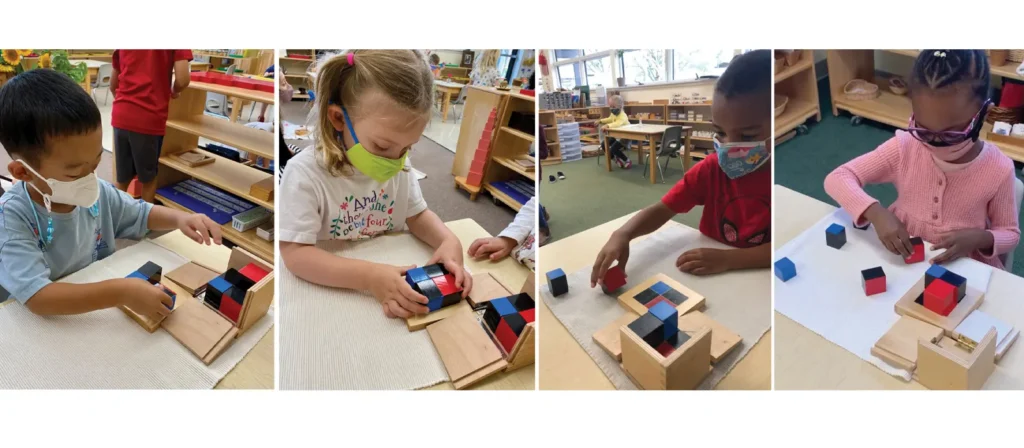
Independence and Self-Motivation
Montessori:
A Montessori classroom fosters independence by allowing children to make choices, complete tasks, and manage their time. Children learn practical skills like pouring, washing, and organizing materials. This independence supports self-confidence and cultivates a sense of accomplishment.
Daycare:
Daycares are more guided and structured by adults, focusing on routines and group activities rather than fostering independence. Caregivers direct children’s daily schedules, promoting social skills rather than self-motivation, making daycare a supportive environment for social growth rather than independent learning.
Academic Focus
Montessori:
In Montessori programs, academic skills are built into daily activities. Children learn math, language, and science concepts through hands-on activities and real-world applications, making learning engaging and relevant. Academic growth is integrated into every part of the Montessori environment.
Daycare:
Most daycare centers emphasize play and social skills rather than academic instruction. While some daycare centers may introduce basic counting, colors, and shapes, the focus is on providing a warm, interactive, and supervised environment rather than academic achievement.
Don’t just dream it, design it! Let’s chat about your custom furniture needs!
Social Development in Montessori vs Daycare
Group Dynamics
Montessori:
The multi-age setup encourages peer-to-peer learning, with older children teaching younger ones, which helps them develop empathy, patience, and leadership skills. Younger children look up to their older peers, and in turn, older children reinforce their understanding by mentoring others.
Daycare:
In daycare, children are usually grouped by age, which allows them to develop friendships and engage in age-appropriate play. The consistent age group fosters camaraderie and teaches cooperation, which is essential for building foundational social skills.
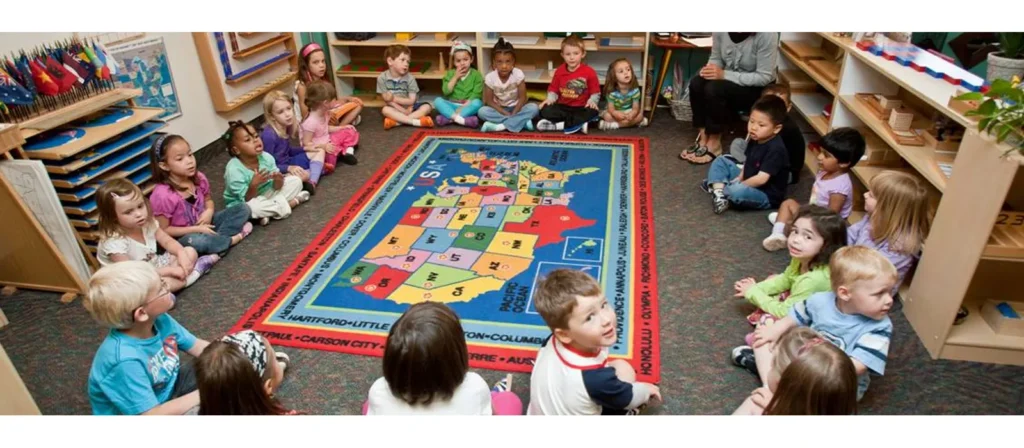
Skill Development
Montessori emphasizes practical life skills such as pouring, cleaning, and organizing. These activities foster fine motor skills, coordination, and a sense of responsibility, preparing children for real-world tasks.
Daycare focuses on social skill development through group play, interaction, and guided activities. Children learn to share, take turns, and resolve conflicts, which supports emotional intelligence and confidence in social settings.
Benefits of Montessori Education
- Encourages Independence: Montessori’s focus on self-directed activities helps children develop confidence, decision-making skills, and a sense of responsibility early on.
- Hands-On Learning: Children engage with tactile materials that make abstract concepts more understandable, which is particularly beneficial in subjects like math and language.
- Promotes Social Skills: The multi-age classroom environment fosters empathy, patience, and cooperative learning, as children learn from and teach one another.
- Enhanced Focus and Discipline: Children in Montessori environments develop longer attention spans as they concentrate on chosen tasks, helping build strong study habits.
Benefits of Daycare
- Flexible and Reliable Care: Daycare centers typically offer flexible hours, supporting the needs of working parents and providing peace of mind with safe, consistent supervision.
- Socialization Through Group Activities: Daily group play helps children learn cooperation, conflict resolution, and sharing, as well as building essential social and emotional skills.
- Routine and Structure: Daycares provide predictable routines that help children feel secure and promote healthy eating, napping, and play habits.
- Nurturing Environment for Younger Children: Daycare offers attentive care and age-appropriate interaction for infants and toddlers, supporting physical and emotional development.
Don’t just dream it, design it! Let’s chat about your custom furniture needs!
Choosing Between Montessori and Daycare: Factors to Consider
Montessori vs Daycare Cost
Montessori vs daycare costs are often higher due to the specialized materials and teacher training involved in the Montessori method. However, costs vary widely depending on location and the specific program. Daycare can be more budget-friendly, especially for families needing full-day, year-round care.
Age of the Child
Montessori programs generally start at around 18 months, whereas daycare centers can care for infants as young as six weeks. Daycare may be more practical for families with younger infants, while Montessori offers unique benefits for toddlers and preschool-aged children ready to engage in more focused learning.
Family Lifestyle and Values
Montessori may be ideal if you value a structured learning environment that promotes independence and personalized growth. For families needing flexibility, especially young children, daycare may better align with your lifestyle.
More Related Questions
- Is Montessori more beneficial for my child than daycare?
Each offers unique benefits: Montessori vs daycare considerations boil down to education versus care. Montessori emphasizes independence and growth, while daycare provides social development in a supervised setting. The choice hinges on your family’s priorities. - How can I tell if my child is a good fit for Montessori?
If your child exhibits curiosity, focus, and independence, they may excel in Montessori. Observing a Montessori classroom can help parents see if the approach suits their child. - Are there Montessori-based daycares available?
Yes, some daycares integrate Montessori principles for a flexible hybrid approach. These can balance daycare vs Montessori vs preschool characteristics, offering structured learning with extended care hours. - What age should my child start Montessori?
Montessori programs generally start around 18 months, though each school may vary. - Is Montessori good for social skills?
Yes, multi-age setups in Montessori foster empathy, collaboration, and respect among children. - How does Montessori handle discipline?
Montessori encourages self-discipline and respect, focusing on internal motivation rather than punishment.
Conclusion
Both Montessori and daycare environments offer invaluable benefits that support children’s development, albeit in different ways. The choice between Montessori vs daycare depends on several factors, including your child’s needs, family priorities, and budget. Montessori’s structure nurtures independence and self-motivation, while daycare provides a flexible, caring environment focusing on socialization. Understanding these Montessori vs daycare differences and similarities will help you make a choice that aligns with your vision for your child’s early learning experience.

